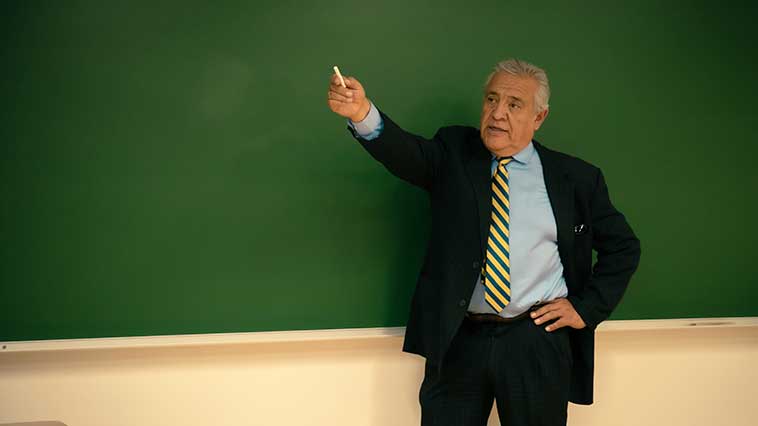ENTREVISTA 3
NOMBRE DEL ENTREVISTADOR: Emigdia Yepis Ferré
_____________________________________________________________________________________________________________________
NOMBRE DEL ENTREVISTADO: Manuel Antonio Reyes Leal.
AÑOS DE SERVICIO: 25 años.
CARRERA CURSADA: Licenciatura en contabilidad.
NIVEL EDUCATIVO LABORADO: Media superior y Superior.

1.- ¿Qué estrategias de enseñanza son las que le han dado mejores resultados durante sus clases y cuáles no tanto y por qué?
La dinámica tradicional, en donde lo que más me ha resultado es motivar al alumno para que se involucre en los temas impartidos por medio de preguntas directas e incentivar la participación en clase, ya que así mantienes al estudiante atento a las explicaciones, además de que es muy motivador que involucres a toda la clase, no solamente a los que habitualmente participan.
Traducción inglés:
1.- Which teaching strategies have given you the best results during your classes and which not so much and why?
The traditional dynamics, where what has worked best for me is to motivate the student to get involved in the topics taught through direct questions and to encourage participation in class, since this way you keep the student attentive to the explanations, besides it is very motivating to involve the whole class, not only those who usually participate.
2.- ¿Qué importancia tiene para usted la implementación de los proyectos en la didáctica educativa?
Es de gran importancia porque para que el alumno comprenda los temas siempre es necesario tener un método, un plan y una estrategia y todo tiene que ir alineado para lograr el objetivo principal que es la enseñanza.
Considero que los maestros deben tener una excelente preparación tanto académica como didáctica, eso aunado a la vocación personal produce efectos importantes en cuanto a la atención de los alumnos para su desarrollo en todas las áreas, no solamente en ciertos sectores específicos sino en general, para formar profesionistas integrales que sean capaces de resolver problemas en un futuro y que sean capaces de resolver cualquier situación que se le presente en su desarrollo profesional.
Entre más completo sea todo el sistema y que esté a tu alcance para medir, para evaluar, para desarrollar todas las capacidades y potenciales de los muchachos, más beneficios traerán a los estudiantes.
Traducción inglés:
2.- What is the importance for you of the implementation of projects in educational didactics?
It is of great importance because for the student to understand the topics it is always necessary to have a method, a plan and a strategy and everything has to be aligned to achieve the main objective, which is teaching.
I believe that teachers must have an excellent academic and didactic preparation, that together with personal vocation produces important effects in terms of the attention of students for their development in all areas, not only in certain specific sectors but in general, to form integral professionals who are capable of solving problems in the future and who are able to solve any situation that arises in their professional development.
The more complete the whole system is and the more it is within your reach to measure, to evaluate, to develop all the capabilities and potentials of the children, the more benefits it will bring to the students.
3.- ¿Cuáles son las características actitudinales más destacables que ve en sus alumnos y a qué cree que se deban dichas actitudes?
Una de las características actitudinales más destacables que observo en mis alumnos es su disposición a participar activamente en clase. Esto se refleja en un porcentaje importante de participación durante las sesiones.
Considero que estas actitudes se deben en gran medida a la forma en que imparto la materia, ya que busco constantemente estrategias para involucrarlos en los temas y hacerles ver la relevancia de lo que están aprendiendo, tanto para su vida diaria como para su futuro profesional. Además de generar un ambiente de confianza en el que se sienten cómodos para expresarse y ser parte de la clase.
Traducción inglés:
3.- What are the most outstanding attitudinal characteristics that you see in your students and why do you think these attitudes are due to?
One of the most outstanding attitudinal characteristics that I observe in my students is their willingness to actively participate in class. This is reflected in a significant percentage of participation during the sessions.
I believe that these attitudes are largely due to the way I teach the subject, since I am constantly looking for strategies to involve them in the topics and make them see the relevance of what they are learning, both for their daily life and for their professional future. In addition to generating an environment of trust in which they feel comfortable to express themselves and be part of the class.

4.- ¿Qué aspectos toma en cuenta al momento de gestionar las actividades dentro del aula y qué es lo más complicado de organizar un grupo?
Al momento de gestionar las actividades dentro del aula, tomo en cuenta varios aspectos. Primero, el nivel de mis alumnos, tanto en lo académico como en lo emocional, porque no todos aprenden al mismo ritmo ni de la misma manera. También considero el tipo de contenido que vamos a trabajar y busco que las actividades sean dinámicas, que los motiven y que les ayuden a comprender mejor lo que están viendo. Me gusta variar entre trabajo individual, en equipo y actividades más prácticas o participativas.
Una de las cosas que más tomo en cuenta es la actitud del alumno. Para mí es muy importante que el muchacho tenga ganas, que muestre entusiasmo, que participe en clase y, sobre todo, que aprenda a trabajar en equipo. Trato de fomentar ese tipo de actitud desde el inicio, porque sé que cuando un alumno se siente motivado, el aprendizaje fluye mucho mejor.
Sin embargo, una de las cosas más complicadas al organizar un grupo es precisamente la apatía y el trabajo en equipo. Muchos alumnos sienten cierto rechazo hacia este tipo de actividades porque, desafortunadamente, no siempre se reparten de forma justa. Hay quienes realmente se esfuerzan, cumplen con su parte, mientras que otros apenas participan o no hacen nada, y al final todos reciben la misma calificación. Eso genera frustración y desmotivación en quienes sí están comprometidos. Por eso intento estar muy al pendiente de cómo se da esa dinámica, para que todos aprendan lo que significa colaborar de verdad y valoren el esfuerzo colectivo.
Traducción inglés:
4.- What aspects do you take into account when managing classroom activities and what is the most complicated part of organizing a group?
At the moment of managing the activities in the classroom, I take into account several aspects. First, the level of my students, both academically and emotionally, because not everyone learns at the same pace or in the same way. I also consider the type of content we are going to work on and I try to make the activities dynamic, motivating and helping them to better understand what they are seeing. I like to vary between individual work, team work and more practical or participatory activities.
One of the things I take into account the most is the student's attitude. For me, it is very important that the student is eager, shows enthusiasm, participates in class and, above all, learns to work in a team. I try to encourage that kind of attitude from the beginning, because I know that when a student feels motivated, learning flows much better.
However, one of the most difficult things when organizing a group is precisely apathy and teamwork. Many students feel a certain rejection towards this type of activities because, unfortunately, they are not always distributed fairly. There are those who really make an effort, do their part, while others barely participate or do nothing at all, and in the end they all receive the same grade. This generates frustration and demotivation in those who are committed. That's why I try to keep a close eye on how this dynamic works, so that everyone learns what it means to truly collaborate and value the collective effort.

5.- ¿Podría contarnos alguna anécdota de un momento significativo en su carrera que lo haya marcado como docente?
Sí, hay un par de ellas. Hubo un semestre en el que creo que ha sido uno de los mejores grupos que he tenido, en donde al terminar el semestre, al dar a conocer las calificaciones, cada uno de los muchachos se levantó a darme un abrazo de despedida, sin excepción, todo el grupo. Para mí fue muy motivante, me hizo sentir aceptación, me hizo sentir el cariño de los muchachos. Fue una experiencia que me dejó marcado.
Otra experiencia fue cuando impartí clases en CBTis No.37, en donde cuando los alumnos me encontraban, ya después de haber terminado el curso, también así, muchos abrazos con mucho entusiasmo, con mucha alegría por parte de ellos de reencontrarse conmigo. Y me agradecían algunos de ellos, apreciando que los haya tomado en cuenta, y que haya despertado en ellos esas ganas de estudiar la materia de contabilidad, que ellos en la mayor parte del tiempo rechazaron.
Para mí fue muy motivante que conmigo se hayan sentido esa necesidad de adquirir ese aprendizaje.
Traducción inglés:
Yes, there are a couple of them. There was a semester in which I think it has been one of the best groups I have had, where at the end of the semester, when the grades were announced, each one of the students got up to give me a goodbye hug, without exception, the whole group. For me it was very motivating, it made me feel accepted, it made me feel the affection of the boys. It was an experience that left a mark on me.
Another experience was when I taught at CBTis No. 37, where when the students met me, after the course was over, also like that, many hugs with a lot of enthusiasm, with a lot of joy on their part to meet me again. And some of them thanked me, appreciating that I had taken them into account, and that I had awakened in them the desire to study accounting, which they had rejected most of the time.
For me it was very motivating that with me they felt the need to acquire this learning.
6.- ¿Qué estrategias ha aplicado para lograr que sus alumnos contextualicen las teorías que se ven en su materia en problemas de la vida real?
Compartir mis experiencias como profesional de la contabilidad y de cómo ellos van a aplicar ese conocimiento para resolver futuros problemas.
Traducción inglés:
6.- What strategies have you applied to get your students to contextualize the theories seen in your subject in real life problems?
Sharing my experiences as an accounting professional and how they will apply that knowledge to solve future problems.